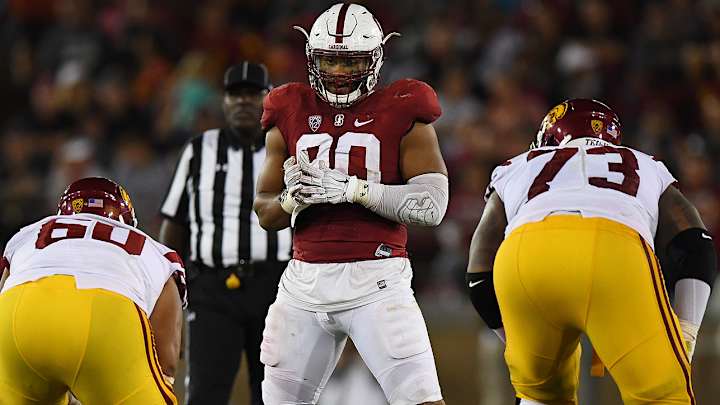2017 NFL draft prospect countdown, No. 6: Solomon Thomas, DE, Stanford

What you need to know: The Pac-12’s Morris Trophy is unique in that it’s voted on by the players—the conference’s offensive linemen vote for the best defensive lineman, and vice versa. Thomas was named the top defensive lineman in 2016, for a season in which he recorded 16.0 tackles for loss and 8.5 sacks. He also landed on the All-Pac-12 first team and the All-America third team. As a redshirt freshman the previous year, Thomas posted 10.5 tackles for loss and 3.5 sacks. A native of Texas, Thomas lived in Australia for five years as a child (more on that in Thomas’s September Q&A with SI’s Lindsay Schnell).
Strengths: There are not many players capable of dominating at the college level the way that Thomas did when he was on his game. He had 12 tackles and 1.5 sacks against Notre Dame; he had another seven tackles (2.0 for loss) and a game-clinching sack against North Carolina in the Sun Bowl. He often demanded multiple blockers, or at the very least a back staying in to help pick him up.
Thomas (6' 3", 273 pounds) can drive O-linemen back on their heels, both off the edge and when stunting or angling inside—his 30 bench-press reps at the combine exhibited his strength. He also showed off a 126-inch broad jump, 6.99-second three-cone and 4.28-second short shuttle in Indianapolis, so there is ample evidence of his athleticism. That comes through in his game, too, especially when he breaks off a spin move or stunts.
He would appear to project best as a 4–3 linemen, perhaps even as a permanent three-tech. But he does offer the flexibility to be scheme-versatile—he shifted between 1-, 3-, 4- and 5-techniques along the Stanford line.
Asked at the combine about the “tweener” label, Thomas said, “I don’t take that as a bad thing. I take it as [that] any team can draft me. I’m not labeled to a 4–3; I’m not labeled to a 3–4 team. I can play any system, and I can play any position on the D-line.”
Thomas entered the draft following his redshirt sophomore season, and he will not turn 22 until December. So, he should be mid-ascension in terms of developing his skill and learning technique.
If the Browns shock the NFL draft with their No. 1 pick, what happens next?
Weaknesses: Being referred to as a “tweener” can come with both positive and negative connotations. Does Thomas have enough strength to live inside or as a two-gapping presence at the next level? Interior O-linemen could move him well off his point of attack with double teams in the run game. Will he develop enough of a repertoire of counter moves to win against NFL tackles outside? Right now, he can get stuck in hand-fighting and lose his leverage.
Despite Thomas’s production at Stanford, the other glaring issue on his tape is in his finishing. His tackles-for-loss and sacks totals could have been far higher had he not allowed so many ballcarriers/quarterbacks to dodge him at the last second. This was very noticeable in Stanford’s bowl game against North Carolina. Credit to Mitchell Trubisky for those escapes (before Thomas’s late sack), but Thomas could have had four or five sacks on the day rather than just one.
Thomas’s desire to penetrate can leave him vulnerable to run plays right at his gap, accompanied by a trap block. This happens to even the best of defensive tackles (see: Suh, Ndamukong), but Thomas will have to be more careful about holding his lane.
NFL player comparison: Michael Bennett
